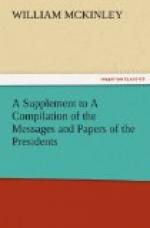The Secretary of the Interior reports that leading Indians have absorbed great tracts of land to the exclusion of the common people, and government by an Indian aristocracy has been practically established, to the detriment of the people. It has been found impossible for the United States to keep its citizens out of the Territory, and the executory conditions contained in the treaties with these Nations have for the most part become impossible of execution. Nor has it been possible for the Tribal Governments to secure to each individual Indian his full enjoyment in common with other Indians of the common property of the Nations. Friends of the Indians have long believed that the best interests of the Indians of the Five Civilized Tribes would be found in American citizenship, with all the rights and privileges which belong to that condition.
By section 16, of the act of March 3, 1893, the President was authorized to appoint three commissioners to enter into negotiations with the Cherokee, Choctaw, Chickasaw, Muscogee (or Creek), and Seminole Nations, commonly known as the Five Civilized Tribes in the Indian Territory. Briefly, the purposes of the negotiations were to be: The extinguishment of Tribal titles to any lands within that Territory now held by any and all such Nations or Tribes, either by cession of the same or some part thereof to the United States, or by allotment and division of the same in severalty among the Indians of such Nations or Tribes respectively as may be entitled to the same, or by such other method as may be agreed upon between the several Nations and Tribes aforesaid, or each of them, with the United States, with a view to such an adjustment upon the basis of justice and equity as may, with the consent of the said Nations of Indians so far as may be necessary, be requisite and suitable to enable the ultimate creation of a State or States of the Union which shall embrace the lands within said Indian Territory.
The Commission met much opposition from the beginning. The Indians were very slow to act, and those in control manifested a decided disinclination to meet with favor the propositions submitted to them. A little more than three years after this organization the Commission effected an agreement with the Choctaw Nation alone. The Chickasaws, however, refused to agree to its terms, and as they have a common interest with the Choctaws in the lands of said Nations, the agreement with the latter Nation could have no effect without the consent of the former. On April 23, 1897, the Commission effected an agreement with both tribes—the Choctaws and Chickasaws. This agreement, it is understood, has been ratified by the constituted authorities of the respective Tribes or Nations parties thereto, and only requires ratification by Congress to make it binding.
On the 27th of September, 1897, an agreement was effected with the Creek Nation, but it is understood that the National Council of said Nation has refused to ratify the same. Negotiations are yet to be had with the Cherokees, the most populous of the Five Civilized Tribes, and with the Seminoles, the smallest in point of numbers and territory.




